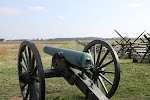Thursday, July 22, 2010
RACIAL TENSIONS RULED LOUISIANA IN THE 1800s
Despite the battles fought in Louisiana during the Civil War—Port Hudson, Mansfield, Pleasant Hill, and others—more violent deaths probably occurred in the state during Reconstruction than in the war itself. Lawlessness reigned in many parts of the state from the war’s end in 1866 through the 1870s, from highway robbery to the intimidation and murder of freed blacks and office-holding carpetbaggers.
In many instances, local white citizens who viewed the new freedoms given former slaves as an affront to Southern society resorted to vigilantism to put blacks in their place and terrorize the Republican officials who protected them. With most parish and state offices held by Republicans, the largely Democrat populace often bypassed despised local lawmen and took care of criminal offenders themselves.
Reconstruction officially ended in 1877 with the removal of federal troops from the South and white Democrats resumed control over most public offices. The animosity of the post-war years remained.
The Crescent Plantation arose from the Mississippi Delta soils of what is now Madison Parish in the 1830s. Consisting of over two thousand acres, the estate on Brushy Bayou was one of the largest in northeast Louisiana. In the 1890s, the plantation was the home to numerous black freedmen and their families who still worked in the same fields their ancestors tilled as slaves. Most owned little or nothing—a pig or two, perhaps a milk cow or a horse. A few owned firearms but mostly they possessed little more than their fathers had before the Civil War.
While the prominent Darcy family owned the Crescent, the workers were supervised by a white man named J. K. Boyce. Little is known of Boyce. His name does not appear on the Madison Parish tax rolls of the late 19th Century. He probably lived in a small home on the plantation. Whether he had family on the plantation is unknown.
Toward the end of April 1894, Boyce’s lifeless body was discovered on the plantation.
Subscribe to:
Comments (Atom)














